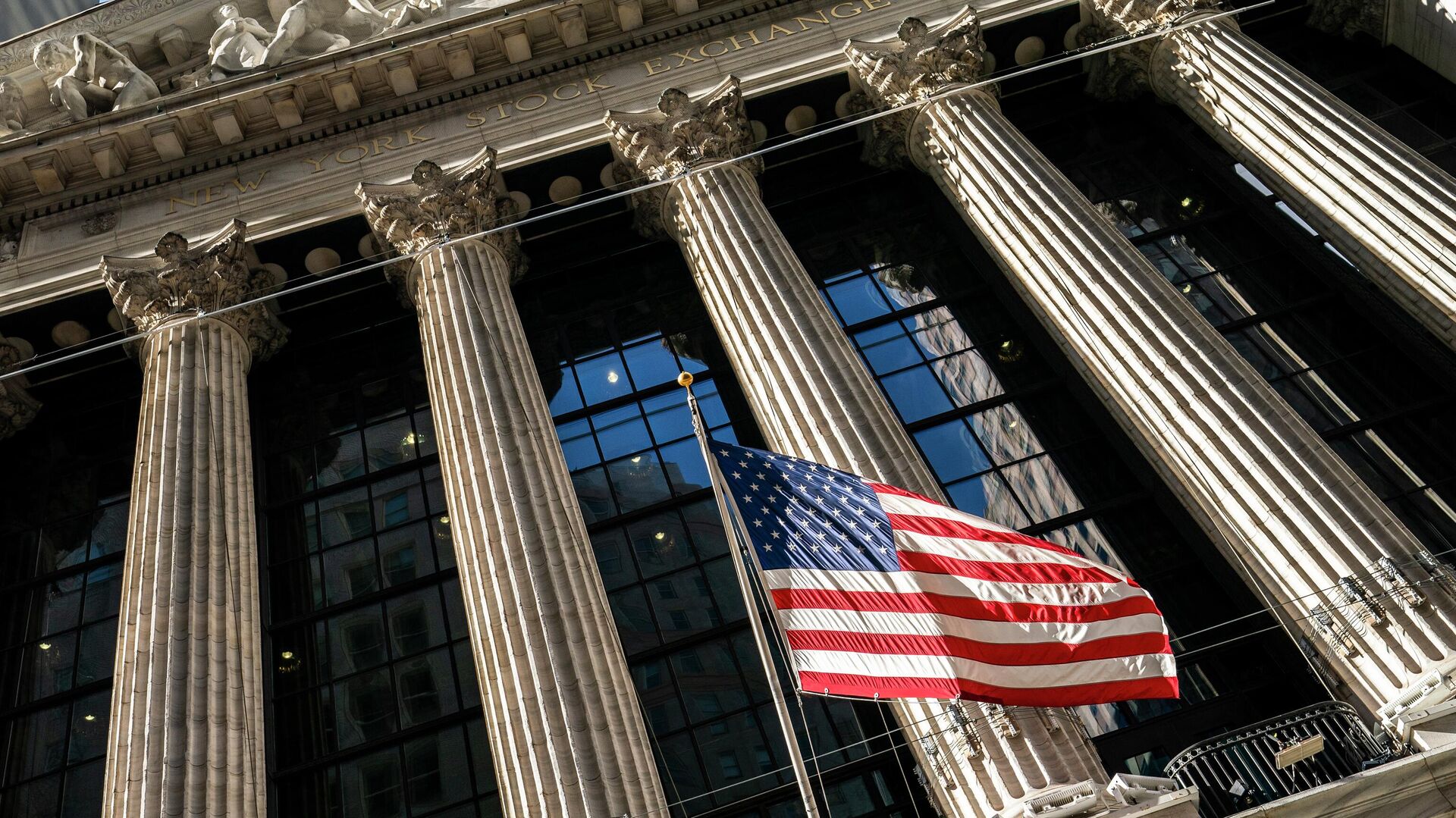https://sputnikglobe.com/20231101/federal-reserve-leaves-us-interest-rates-unchanged-at-22-year-high-1114649386.html
Federal Reserve Maintains Record-High US Interest Rates for Fourth Consecutive Meeting
Federal Reserve Maintains Record-High US Interest Rates for Fourth Consecutive Meeting
Sputnik International
At its monthly meeting on Wednesday, the US Federal Reserve again declined to raise interest rates above their already-record-high point, marking the fourth consecutive meeting at which they have maintained rates.
2023-11-01T18:34+0000
2023-11-01T18:34+0000
2023-11-08T19:30+0000
economy
us federal open market committee (fomc)
us
federal reserve
interest rate
inflation
rate hikes
us economy
jerome powell
https://cdn1.img.sputnikglobe.com/img/07e6/05/04/1095272424_0:321:3071:2048_1920x0_80_0_0_567714ac57b74db48660415d8f7574c6.jpg
At its monthly meeting on Wednesday, the US Federal Reserve again declined to raise interest rates above their already-record-high point, marking the fourth consecutive meeting at which they have maintained rates.Fed chair Jerome Powell told reporters in comments on Wednesday afternoon that the bank isn’t sure that interest rates are high enough to fight inflation, so it cannot discount the possibility of further rate hikes in the near future. However, he noted the Fed had not put expectations of a recession back into its economic forecast, either.Powell spoke of a “lag effect” on last year’s aggressive rate hikes, saying that the impact on inflation, or the depreciation in value of the US dollar, was only now being felt.“Recent indicators suggest that economic activity has been expanding at a strong pace, and well above earlier expectations,” Powell said. “We are attentive to recent data showing the resilience of economic growth and demand for labor. Evidence of growth persistently above potential, or that tightness in the labor market is no longer easing, could put further progress on inflation at risk and could warrant further tightening of monetary policy.”“Financial conditions have tightened significantly in recent months, driven by higher longer-term bond yields, among other factors. Because persistent changes in financial conditions can have implications for the path of monetary policy, we monitor financial developments closely. In light of the uncertainties and risks, and how far we have come, the Committee is proceeding carefully.”At its previous meeting in September, the Fed indicated it expected to raise interest rates by another 25 points, to between 5.5% and 5.75%, by the end of the year. However, the bank only has one more meeting left before 2024.However, Powell acknowledged the negative economic impacts of increasing interest rates as well, which include a marked decline in job creation and a spike in mortgage interest rates, which discourages buying houses - a key US market.Critics of the Fed have said the bank waited far too long to react to rising inflation in 2020 and 2021, and that raising interest rates impacts poorer Americans the worst while largely sparing the rich. They have pointed to data from 2022 showing that the majority of price increases over the previous two years was attributable not to inflationary pressures such as high gas prices, but to speculation and price-gouging by sellers.
https://sputnikglobe.com/20231005/huge-financial-burden-of-ukraine-support-driving-fatiguein-us-and-europe-1113962336.html
Sputnik International
feedback@sputniknews.com
+74956456601
MIA „Rossiya Segodnya“
2023
News
en_EN
Sputnik International
feedback@sputniknews.com
+74956456601
MIA „Rossiya Segodnya“
Sputnik International
feedback@sputniknews.com
+74956456601
MIA „Rossiya Segodnya“
federal reserve, interest rate, raising interest rate, federal reserve, us interest rates hikes, inflation, us central bank, inflation, us recession, interest rate hike, what will the fed do next, next federal reserve meeting, federal reserve, monetary tightening, us economy, us unemployment, us inflation rate, monetary policy, economic recession in us, rate hikes
federal reserve, interest rate, raising interest rate, federal reserve, us interest rates hikes, inflation, us central bank, inflation, us recession, interest rate hike, what will the fed do next, next federal reserve meeting, federal reserve, monetary tightening, us economy, us unemployment, us inflation rate, monetary policy, economic recession in us, rate hikes
Federal Reserve Maintains Record-High US Interest Rates for Fourth Consecutive Meeting
18:34 GMT 01.11.2023 (Updated: 19:30 GMT 08.11.2023) After the global economic crash triggered by social lockdowns at the start of the COVID-19 pandemic, the Federal Reserve tolerated rising inflation for fear that raising interest rates would impact the fragile economic recovery. However, after it hit record highs in early 2022, the central bank was compelled to act.
At its monthly meeting on Wednesday, the US Federal Reserve again declined to raise interest rates above their already-record-high point, marking the fourth consecutive meeting at which they have maintained rates.
“Tighter financial and credit conditions for households and businesses are likely to weigh on economic activity, hiring and inflation,” the central bank said in a statement. “The extent of these effects remains uncertain. The Committee remains highly attentive to inflation risks.”
Fed chair Jerome
Powell told reporters in comments on Wednesday afternoon that the bank isn’t sure that interest rates are high enough to fight inflation, so it cannot discount the possibility of further rate hikes in the near future. However, he noted the Fed had not put expectations of a recession back into its economic forecast, either.
Powell spoke of a “lag effect” on last year’s aggressive rate hikes, saying that the impact on inflation, or the depreciation in value of the US dollar, was only now being felt.
“The stance of policy is restrictive, meaning that tight policy is putting downward pressure on economic activity and inflation, and the full effects of our tightening have yet to be felt,” he said.
“Recent indicators suggest that economic activity has been expanding at a strong pace, and well above earlier expectations,” Powell said. “We are attentive to recent data showing the resilience of economic growth and demand for labor. Evidence of growth persistently above potential, or that tightness in the labor market is no longer easing, could put further progress on inflation at risk and could warrant further tightening of monetary policy.”

5 October 2023, 18:50 GMT
“Financial conditions have tightened significantly in recent months, driven by higher longer-term bond yields, among other factors. Because persistent changes in financial conditions can have implications for the path of monetary policy, we monitor financial developments closely. In light of the uncertainties and risks, and how far we have come, the Committee is proceeding carefully.”
At its
previous meeting in September, the Fed indicated it
expected to raise interest rates by another 25 points, to between 5.5% and 5.75%, by the end of the year. However, the bank only has one more meeting left before 2024.
In the two months before that meeting, inflation had begun to slowly creep upward after more than a year of decline, but the US Bureau of Labor Statistics’ report in October, which reflected economic data from September, showed inflation holding steady at a 3.7% increase over the previous year.
However, Powell acknowledged the negative economic impacts of increasing interest rates as well, which include a marked decline in job creation and a spike in mortgage interest rates, which discourages buying houses - a key US market.
Critics of the Fed have said the bank
waited far too long to react to rising inflation in 2020 and 2021, and that raising interest rates impacts poorer Americans the worst while largely sparing the rich. They have pointed to
data from 2022 showing that the majority of price increases over the previous two years was attributable not to inflationary pressures such as high gas prices, but to speculation and price-gouging by sellers.



